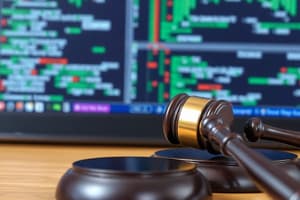Podcast
Questions and Answers
Under which condition is the data processor not responsible for data accuracy?
Under which condition is the data processor not responsible for data accuracy?
What is the scope of application of the law 3/1981 concerning data processing?
What is the scope of application of the law 3/1981 concerning data processing?
What does the confidentiality obligation ensure?
What does the confidentiality obligation ensure?
Which statement correctly describes the relationship between confidentiality and professional secrecy obligations?
Which statement correctly describes the relationship between confidentiality and professional secrecy obligations?
Signup and view all the answers
Which statement accurately reflects the processing of data by courts and tribunals according to the Rosamue?
Which statement accurately reflects the processing of data by courts and tribunals according to the Rosamue?
Signup and view all the answers
What category of data is explicitly excluded from the scope of application of autonomous law?
What category of data is explicitly excluded from the scope of application of autonomous law?
Signup and view all the answers
What restriction is placed on accessing data from deceased individuals?
What restriction is placed on accessing data from deceased individuals?
Signup and view all the answers
Who may access the data related to deceased minors?
Who may access the data related to deceased minors?
Signup and view all the answers
What does the obligation in the previous clauses depend on?
What does the obligation in the previous clauses depend on?
Signup and view all the answers
Which law explicitly states that data must be accurate and timely?
Which law explicitly states that data must be accurate and timely?
Signup and view all the answers
What is true regarding the processing of data from deceased individuals?
What is true regarding the processing of data from deceased individuals?
Signup and view all the answers
What must the data responsible ensure regarding the data they process?
What must the data responsible ensure regarding the data they process?
Signup and view all the answers
What can be done with the data of deceased individuals according to the provided content?
What can be done with the data of deceased individuals according to the provided content?
Signup and view all the answers
Which body is responsible for processing the data connected to the Ministry of Justice?
Which body is responsible for processing the data connected to the Ministry of Justice?
Signup and view all the answers
Which statement about the confidentiality clause is correct?
Which statement about the confidentiality clause is correct?
Signup and view all the answers
Which of the following describes the treatment of heredity data according to the content?
Which of the following describes the treatment of heredity data according to the content?
Signup and view all the answers
Study Notes
Act 2.4
- Treatment of data: Data processed by different bodies (e.g., ministries)
- Key laws: 3/1981, 6/1985, 61/1985
- Relevant bodies: Ministries, judicial offices, other relevant institutions
Act 2.5
- Data processing: Laws govern how data is handled.
- Relevant bodies: Ministries, judicial offices, social security, other similar bodies
Act 3. Data of deceased persons
- Deceased persons' data: Handling data of deceased people
- Rights of inheritors: Rights of inheritors, heirs to data, executors of deceased individuals.
- Legal issues: Dealing with legal implications and requirements related to deceased individuals' data
Act 3.1
- Deceased's data: Inheritance/ heirs have rights to deceased person's data
- Exceptions: Exceptions where these rules do not apply
- Legal processes: Procedures for obtaining data
Act 3.2
- Access to data: Processes for obtaining data of deceased persons
- Institutions: Organizations & individuals allowed to access and use the data
- Documentation: Required documentation for access
Act 3.3
- Deceased minors: Specific legal issues related to deceased minors
- Legal representatives: Roles & responsibilities of legal representatives, guardians
Act 4. Accuracy of data
- Data accuracy: Data must be accurate and updated
- Data custodian responsibility: Custodian is responsible for data accuracy
- Correction processes: Procedures for correcting inaccurate data
Act 5. Duty of confidentiality
- Confidentiality obligation: Individuals and organizations have a duty of confidentiality
- Specific examples: Examples of situations requiring confidentiality
- Legal implications: Penalties for violating confidentiality
Studying That Suits You
Use AI to generate personalized quizzes and flashcards to suit your learning preferences.
Related Documents
Description
This quiz covers the key regulations and laws governing the handling of data by various bodies, including those related to deceased individuals. It explores the rights of inheritors and the procedures for accessing data of deceased persons. Test your knowledge on Acts 2.4, 2.5, and 3 related to data management and legal implications.




